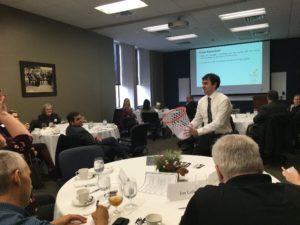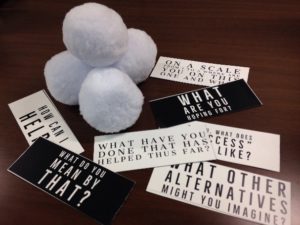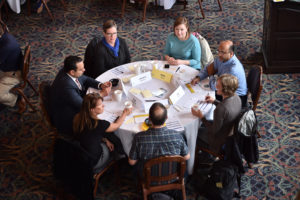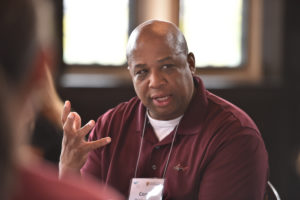Category: Powerful Questions
Building your Coaching Snowball – Notre Dame Research Coaching Lunch
In an effort to continue the coaching momentum in our division and inspired by the Sharpening Your Coaching Skills event held on Sept 12, Notre Dame Research (NDR) held two coaching lunches for our managers this winter. During these lunches, we had an invited speaker and a couple of activities that gave managers the opportunity to further practice their coaching skills in addition to a very special give away at the end of the workshop (like the ND Courage rock).
We kicked off the lunch with an invited speaker – Kristen Morin from OIT. She shared her coaching journey and talked about the initial struggles and successes she’s had. Our NDR managers greatly appreciated hearing about another manager’s point of view and experience with turning what she had learned into action.
After her talk, I introduced a special theme for the day – a snowball. In addition to being a perfect theme due to the weather, snowballs, like coaching skills, need to be built in order be effective. Good snowballs are not made with one handful of snow. Instead, snowballs take many handfuls of snow that need to be shaped and packed. Good coaches are not made with one training sessions. It takes multiple attempts, successes, failures and learning from others to build a good coaching skill set.
In the first practice activity, I asked each table to reflect and share best practices that they have used to continue their coaching momentum. At the conclusion of the table discussion, I asked the larger group what to share an idea they heard that they will start doing.

In the final activity, I posed coaching scenarios to managers (based on their own struggles) and asked them to “coach me through it” by blurting out powerful questions that they would ask if they were approached with the problem. I provided “stuck cards” on each table for inspiration should they have trouble thinking of a question. You wouldn’t believe how quickly open ended questions asked by the audience turned into “advice giving,” but I think this was also powerful for others to see that it is a habit many of us have when people approach us with a problem.
I closed out the lunch by giving all participants a snowball that they could take with them. I hope they use them at their desk as stress reliever or maybe as a reminder for them to push forward, coach and build their coaching snowball. If you are looking to have a similar activity in your area or division and have any questions about what we did at NDR , please feel free to reach out!
Andrew Brown
Operational Effectiveness, Assistant Program Director
Notre Dame Research
abrown20@nd.edu

Mike Seamon on How He’s Used Coaching
The Power of the Rock (by Kara Palmer)

As you know, at the end of the Coaching Workshop, every participant leaves with a blue rock with the word “Courage” on it. This rock is meant to remind us of the new skills that were introduced and to empower us to ask powerful questions, WAIT/WAIST, don’t problem solve and to keep the “monkey” off of our backs by enabling others to solve their own problems. But little did I anticipate that the rock would be a useful tool in and of itself.
Shortly after my boss attended the workshop we were in the midst of talking through a difficult situation that had arisen in the College. There was no easy answer and we were both in the thick of the matter and looking at it from our own very personal lenses. We were sitting at a round table in the middle of his office and, there in the center of it, was where he left his “Courage Rock” from his session.
 Its mere presence was a reminder to me to approach the problem together in a more inquiry-based fashion. I physically grasped the rock, smiled and began to ask him powerful questions about the issue at hand. He then reciprocated the method and our conversation opened up a higher level of dialogue. That physical gesture of putting my hand on the rock let my boss know that I was going to practice my coaching skills and also gave me permission to challenge our thinking and problem-solving in a collegial way that was understood by both of us.
Its mere presence was a reminder to me to approach the problem together in a more inquiry-based fashion. I physically grasped the rock, smiled and began to ask him powerful questions about the issue at hand. He then reciprocated the method and our conversation opened up a higher level of dialogue. That physical gesture of putting my hand on the rock let my boss know that I was going to practice my coaching skills and also gave me permission to challenge our thinking and problem-solving in a collegial way that was understood by both of us.
We have had many conversations since that day in which one of us will say something like, “Let me put my coaching hat on and ask you a question.” Or, one of us might physically move over to and grab the rock in order to change our conversations. It’s a work in progress and we both have asked our fair share of Yes/No questions and have also moved to problems solving quicker than we should. However, that rock has been a powerful reminder and tool to encourage us to continue to exercise “the muscle” and reframe our approach to problem-solving.
Courageous questions lead to courageous actions (by Katie Rose)
How often do we talk with our colleagues, listening to their stress and worries, and then tell them what to do or try to fix it? Those responses come from a caring place, but do we really know what will bring them back to a state of calm that helps them be productive or take that next courageous step?
I was panicking in a recent leadership training exercise that put me very far outside my comfort zone. My heart raced; I was hyper-alert; my breathing was shallow and quick. I was quite literally afraid for my own safety, and because I was so anxious, I worried that my panic could put others in harm’s way. I wanted to be there; I wanted to participate and be part of our group, everyone else seemed to be okay, but all the warning bells were ringing in my head.
And then someone asked me, “What do you need to feel safe?”
That one question made me pause, putting aside my fear for a moment, and it was something only I could answer. It gave me control, reframing the situation in a way that let me decide what would help the most. It also gave me the opportunity to clearly share my boundaries and what I needed from others so that they could support me while we worked together. That question allowed me to find the courage to do something I wasn’t sure I could do, and ultimately, it led to our group completing our activity more smoothly and with more success.
Just think of the courageous next steps our colleagues might decide to take when given the opportunity to set their own course.

Powerful Question: What would it take to make it better? (by Tammy Freeman)

In the years I’ve been a leader, I can honestly say the best conversations I’ve had were those in which I used a coaching approach. Instead of telling someone what to do, I asked for their thoughts and they ended up discovering the answer.
Recently I had an individual who was having an issue with a co-worker. After asking about the situation I asked a powerful question – “what would it take to make it better”. The reply led the person to realize a conversation between them was needed and went on to have that conversation. I later heard that the interaction went really well and the situation had improved.